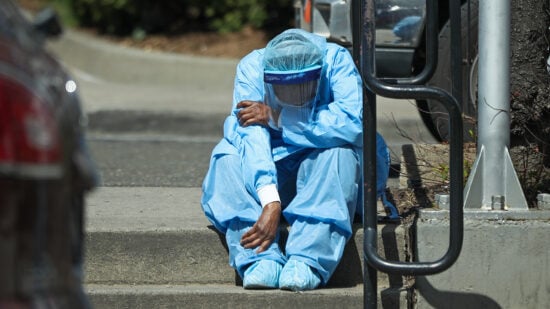NEW YORK, USA - APRIL 1: A sad and tired healthcare worker is seen by the Brooklyn Hospital Center in New York, United States on April 1, 2020. New York is the U.S. state worst-hit by the pandemic. As New York state grapples with the novel coronavirus outbreak, 1,941 people have died and 83,712 have tested positive for the virus, Governor Andrew Cuomo said Wednesday. (Photo by Tayfun Coskun/Anadolu Agency via Getty Images)
I have lived many experiences in the hands of Nigerian healthcare, and I have also led a couple of research into the sector. So, I know, and I try to avoid telling her stories because no single story about the sector is complete.
For instance, “the Nigerian health sector is a mess” is a natural retort you hear when Nigerians are frustrated by the sector. This is correct until you realise that they are also some of the best in the world when it comes to certain issues. In 2018, as a student in the United Kingdom, I was ill and reported myself to a UK government hospital under the National Health Service, popularly known as NHS.
In very dire pain, I was held up in an emergency queue for four hours. Eventually, when it was time to diagnose and treat me, the medical officers did not know how best to treat me. First, they did not have my extensive medical history and were not very familiar with the illness, which was considered a West African disease. They prescribed drugs that I had always been warned about back home. I had to refuse and provide more context. Thankfully they listened and took a different course of action.
All my life, I have never waited in a hospital emergency queue in Nigeria for four hours — even at public hospitals like the University College Hospital, Ibadan. But I hear the stories are changing, public and private hospitals across Nigeria are getting more than they can handle. Doctors and nurses are fed up with the quantum of work and lack of resources.
Advertisement
THE BRAIN DRAIN
It is no news that Nigerian doctors are overworked and underpaid. Hence, the fatigue. I have a friend who worked at the Lagos University Teaching Hospital (LUTH). He gave his all. Every other month, he exhausted his salary by buying critical items for poor patients. No gloves, no injections, no bed space, was the constant retort. After a while, he could no longer take it. He applied to “greener pasture” and left Nigeria.
He is one of more than 1,000 doctors that Nigeria loses to the UK every year. The numbers for US, Canada, and Saudi Arabia are also increasing by the day.
You must have heard the government trying to solve this problem by coming up with draft bills or potential laws to stifle the migration of doctors and nurses from Nigeria. It’s the Nigerian way; to control demand and not address supply and all the other systemic issues attached.
Advertisement
That we complain about brain drain as much as we do and we still have our hospital saving lives on a daily basis is actually a testament to how good we are and how much more we can be if the conditions were a little closer to ideal. That other countries want our doctors and nurses is evidence that our despite the challenges in our schools, the instruction for medics is still top-tier.
So Nigeria’s healthcare system is a mess, but it’s also a lifesaver.
UNTANGLING HEALTHCARE IN NIGERIA
If we were to fix Nigeria’s healthcare problem, we would need to go beyond solving brain drain. As is the case with many Nigerian problems, there’s money involved somewhere. I was recently ill and ended up in a healthcare facility where my health insurance was not in effect.
I paid for every night stayed in the hospital, and it was more expensive than the average hotel night in Lagos. At the end of the treatment phase, I had spent more than three months’ salary in eight days. Fortunately, I could afford to do so. But it got me thinking about millions of people who do not have health insurance of any kind and those who have but their subscription cannot cover the kind of illness they face.
Advertisement
This means they resort to other forms of treatment, most of which could be detrimental to their health. Or they come online to beg for help, as we have seen very frequently. Poor health insurance system leads to poor care, leads to poor payment for doctors, leads to poor funding for teaching hospitals and ultimately ends up at Braindrain Avenue.
The manpower is the last problem, but it gets the most media attention and PR. Solving the problem will not follow this pattern.
If teaching hospitals are better equipped and can train more doctors, we can strive to train more doctors. While we train more doctors, we set in place a robust, national health insurance system that allows money to flow into the system and get doctors paid good enough money to want to stay in Nigeria.
Agreed, some will still live. But if we train 100 doctors and 25 leave, we are left with 75. If we train 200 and 50 leave, we are left with 150. We would still have more hands than we previously did.
Advertisement
Until we start to look at the issues with healthcare in Nigeria from just a brain drain perspective to an entire systems and sectoral issue, we may be headed nowhere. Ditto for nurses and other healthcare professionals.
How do you think we can untangle the issues around healthcare in Nigeria? Tell Mayowa on Twitter and across other social media channels @OluwamayowaTJ.
Advertisement
Add a comment







